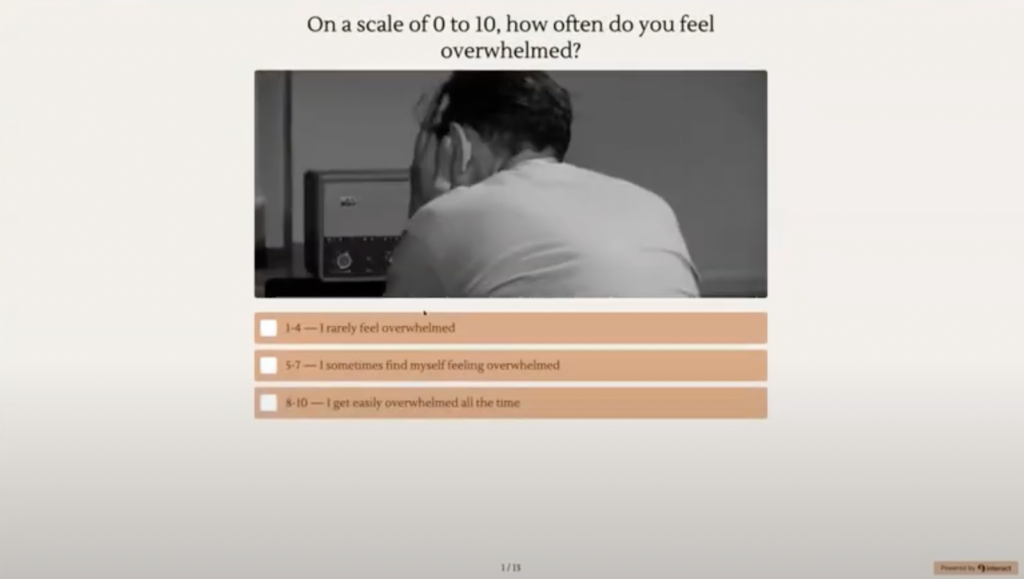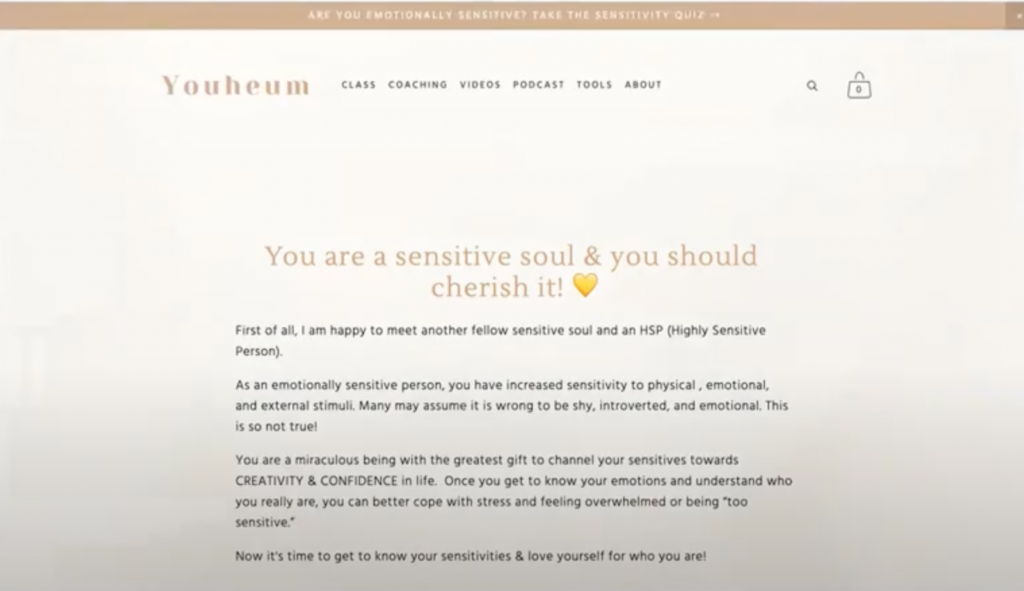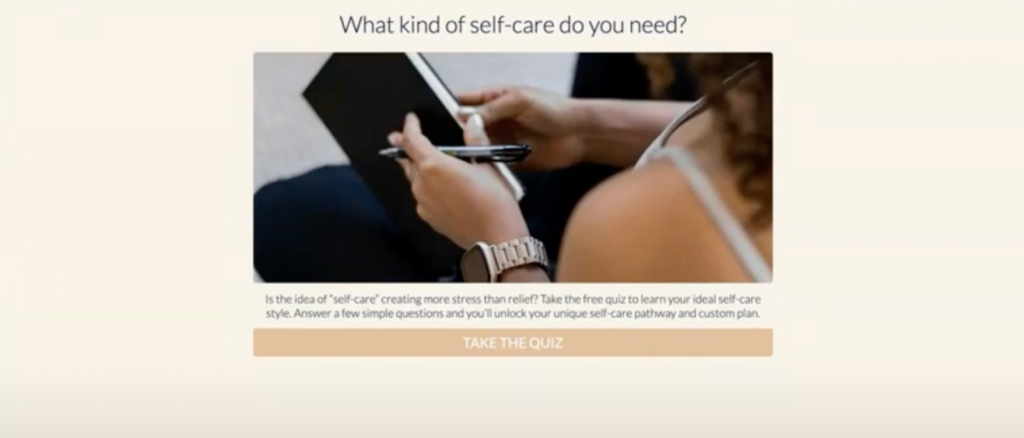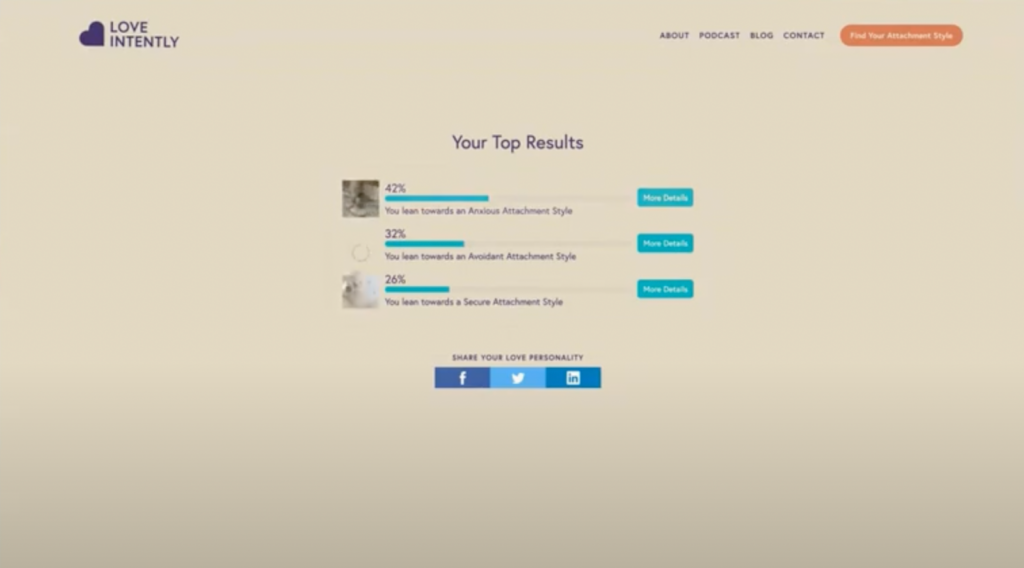Let’s talk about quiz strategy for emotional and relational coaching businesses that include courses, classes, videos, and podcasts. So many of our customers are succeeding in this space, which makes a lot of sense. If you think about the classic, popular personality quizzes, they’re well suited for relational coaching or helping people through dating, marriage, or whatever relationship they may be in.
Read on for a couple of strong relationship quiz examples. We’ll look at three slightly different quizzes and break down quiz and list-building strategies for relationship or emotional coaches.
Let’s get started!
Table of contents
- Your Quiz Should Reflect How You Show Up
- Your Emotional and Relational Coaching Quiz Highlights Positivity
- Quiz Imagery Matches Website Design
- Emotional and Relational Coaching Quiz Should Be Actionable
- Choose a Title that Narrows Your Quiz Topic
- Interact Resources
- Final Thoughts on Emotional and Relational Coaching Quiz Strategy
Your Quiz Should Reflect How You Show Up
The first point of strategy is that you want your quiz to reflect how you show up. For example, if you tend to have long conversations with new clients, you’ll probably want your quiz to be on the longer side. But if you’re highly intuitive and can pinpoint areas where someone could use help without much conversation, then you might create a shorter quiz.
Try asking yourself the below questions when creating your quiz to help simplify the process:
- How do I want to show up? How do I want to connect with my potential customers and audience?
- What will resonate in terms of how I want to show up in this process?
Rather than solely focusing on everybody taking your quiz, focus on being true to yourself.
Time to take a look at the first quiz!
Quiz #1
First, let’s look at Tap with Youheum’s quiz: “Are you emotionally sensitive? Take the sensitivity quiz.” The front page of the quiz has a feature picture of Youheum and two short sentences.

The little blurb before taking the quiz doesn’t mention any negative connotations that might come with “sensitivity.” Instead, it focuses on how people can use “sensitivity” as a gift.
Your Emotional and Relational Coaching Quiz Highlights Positivity
This leads us to our second point: Use your quiz to highlight a positive aspect of the quiz-taker.
A negative version of the quiz mentioned above could read, “Why are you so emotional all the time?” You can see how this negative tone is not motivating. If anything, it’s demeaning and makes people not want to show up and work on themselves.
You want quiz-takers to react positively to your quiz so you can motivate them.
Here is another example from the quiz:

The GIF used for this quiz exemplifies this question but is also on brand. Also, the black-and-white GIF works well with the muted tones of this quiz. You’ll often see a website with a neutral scheme with a bright and flashy GIF, which can make a website look unfinished or unprofessional.
Quiz Imagery Matches Website Design
This leads us to point number three! The imagery and GIFS you use in your quiz must match the design of your website. A mismatched website will throw people off, making them less likely to finish the quiz or opt in.
Tap with Youheum did a nice job of choosing GIFs that match her site’s design.
As we finish up the quiz, let’s take a closer look at how she set up the results.

You can see the “Enter your email to see results!” The only point we have to make here is to personalize the title to match the topic of the quiz. Overall, the design fits the website, so it’s solid.
Note: We legally cannot advise specifically what to put on opt-in forms. You must consult with your legal professional about that.
After clicking “skip this step,” you will be redirected to a result page.

The actual content of the result page is excellent, and there’s a special offer to join a free class if you scroll down the page. This is a great setup.
However, we would suggest building out the result page a bit more—which takes us to the fourth point.
Emotional and Relational Coaching Quiz Should Be Actionable
Point number four is to build out your results to give people actionable items. Some examples from the first quiz are, “You are a miraculous being with the greatest gift to channel your sensitivity towards CREATIVITY & CONFIDENCE in life.”
That’s a good start, but adding some bullet points about what people can do with their highly sensitive souls could be helpful. Any action items your customers can run with for the rest of their day are beneficial. You could provide them with a podcast episode to listen to, a YouTube short, or a PDF, for example. Overall, this is still a well-crafted quiz.
Quiz #2
Let’s look at the quiz from Balanced Black Girl, an awesome podcast about wellness, connection, and finding balance. Les’s quiz is on the home page, which is about finding your “Self-Care Archetype.”

When the quiz loads, it reads “What kind of self-care do you need?” We can now transition to our next point.
Choose a Title that Narrows Your Quiz Topic
Point number five takes a closer look at the title of the quiz:

This title implies the quiz will help people find ways to implement self-care into their lives. Viewers know from the quiz title that it will help them identify what self-care is and how to achieve it. It narrows down the topic and allows quiz-takers to walk away with actionable content.
So point five for emotional and relational coaching quiz strategy focuses on making a title that narrows down your quiz topic and provides readers with usable content. Try accomplishing this by reconstructing content from actual conversations you’ve had with clients.
Again, these quiz questions used great GIFs that matched the site’s design. Question strategy, at a high level, goes back to how you talk. So, however you talk, put that in the question text (the image below shows where you would use your own language):

Then, use people’s typical responses in the answer choices. It’s so much easier to reconstruct from your actual conversations.
The results landing page for the second website looks like this:
We opted-in to get our results.
Note: Requiring an email address in exchange for quiz results is not always the best practice. We recommend showing results right away. But if requiring an email address feels suitable for you, then you can send the results in an email.
Quiz #3
Let’s jump to the third website, which is Love Intently. It’s a great podcast by Sophie Kwok about relationships, conflict, and connection. She talks about human design type and trauma.
This quiz stood out because it’s different from the others—it’s long and an attachment-style quiz. The quiz is forty questions, and the design is much simpler than other quizzes.
Real quick, let’s go back to the first point: you want to write in ways that will connect with how you really show up. You may need 40 questions to understand somebody; this quiz is an excellent example. She did a fantastic job of writing these questions so it doesn’t just feel like you’re filling out some long survey.
Also, the simple design of the quiz and the way that it shows up on this page makes the quiz feel shorter than it is. While we clicked through it fast, taking the quiz felt like an experience. The only other way to achieve this is by physically sitting down with people taking your quiz. You can ask them your questions and see what their responses are like.
After finishing the quiz, we opted-in to see our attachment styles. The results page looked like this:

Quiz-takers get a breakdown of their top results. They can click on their results and read more. This is neat because it makes it worth the time to answer forty questions.
This brings us back to point number four for emotional and relational coaching quiz strategy. You want those results built out to reflect the level of investment that somebody put into your quiz. If it’s a short quiz, around five questions, you might have a small blurb and a link to check out more information. If somebody’s investing more than ten minutes on your quiz, then giving them a longer explanation will be appreciated. In the case of the third website, you can read through your three top results and get extensive information.
The big money maker for our quizzes is opt-in on your quiz website. At Interact, across our portfolio of quizzes, the average opt-in rate is 40%—which means 40% of people who start a quiz opt in on average. We’ve generated about 90 million leads across all our customers over the last ten years, so we’ve been doing this for a long time.
Interact Resources
We have some really cool resources for you, especially for building relationship quizzes. Check out all the different pre-made quiz templates we have to offer and see which one best fits your band. Interact built out these quizzes according to the above best practices.
You can also book a strategy call to chat with one of our experts about how to best set up your quiz before jumping in.
Final Thoughts on Emotional and Relational Coaching Quiz Strategy
These are the best practices for relational quizzes. The most critical takeaway is to show up as yourself and connect with people as you would in real life. That will keep you grounded in creating the quiz experience, leading to better results in getting those opt-ins and building that email list.
Give this a shot, check out our website for resources, and browse through those templates!
Editor’s note: This article was originally a transcript reworked by Sophia Stone, Interact Marketing Intern